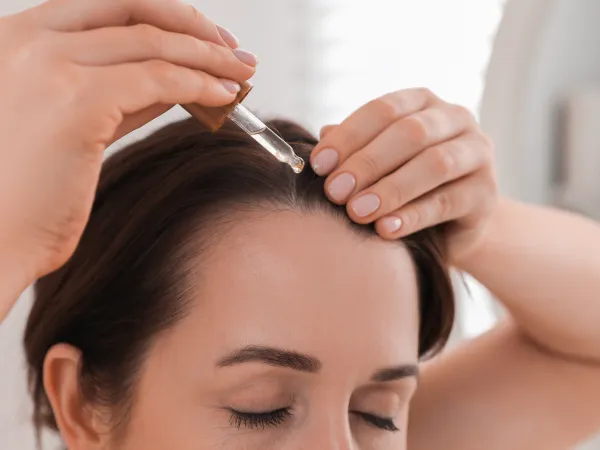Achieving fuller, healthier hair can feel like a challenge, especially for women over 35. However, nature provides a wealth of oils that can nurture your scalp, strengthen hair, and promote Hair Growth naturally.

In this guide, we explore how various oils work, which ones are best suited for your hair type, and practical tips for incorporating them into your routine to unlock luscious locks.
Table of Contents
Why Oils Matter for Hair Growth
Natural oils are rich in essential nutrients, fatty acids, and antioxidants that help:
- Nourish the Scalp: Oils moisturize and protect the scalp, creating an ideal environment for hair follicles to thrive.
- Strengthen Hair Strands: By penetrating the hair shaft, oils can reduce breakage, split ends, and damage caused by environmental stressors.
- Stimulate Blood Circulation: Massaging oils into your scalp increases blood flow, delivering more nutrients and oxygen to the hair follicles.
- Provide Essential Vitamins: Many oils are high in vitamins (such as E and K) that support cell regeneration and overall hair health.
Top Oils for Hair Growth
1. Coconut Oil
- Benefits: Deeply moisturizing and rich in lauric acid, coconut oil penetrates the hair shaft, reducing protein loss and strengthening strands.
- How to Use: Apply as a pre-wash treatment or use as an overnight mask to deeply nourish your hair.
2. Castor Oil
- Benefits: Known for its thick consistency and high ricinoleic acid content, castor oil can help stimulate hair growth and improve scalp circulation.
- How to Use: Mix castor oil with a lighter carrier oil (like coconut or jojoba oil) and massage into the scalp for best results.
3. Argan Oil
- Benefits: Rich in antioxidants, vitamin E, and essential fatty acids, argan oil helps restore shine, reduce frizz, and protect hair from damage.
- How to Use: Use a few drops as a finishing oil to smooth hair and add extra moisture without weighing it down.
4. Olive Oil
- Benefits: Olive oil is packed with vitamin E and monounsaturated fats, which help condition and strengthen hair while promoting a healthy scalp.
- How to Use: Warm olive oil and massage into your scalp, then cover your hair with a shower cap for 30 minutes before washing.
5. Jojoba Oil
- Benefits: Similar in composition to the natural sebum of your scalp, jojoba oil helps balance oil production and deeply moisturizes without clogging pores.
- How to Use: Use as a daily leave-in treatment to keep your hair soft and hydrated.
6. Essential Oils (Rosemary, Peppermint, Lavender)
- Benefits: When combined with carrier oils, essential oils can further boost hair growth by improving circulation and reducing scalp inflammation.
- How to Use: Add a few drops to your favorite carrier oil, mix well, and apply directly to your scalp.
How to Incorporate Oils into Your Hair Care Routine
Daily and Weekly Routines
- Scalp Massage: Incorporate oil massages into your routine 2-3 times a week. Warm your chosen oil and gently massage it into your scalp for 5-10 minutes. This not only nourishes the scalp but also helps stimulate blood circulation.
- Pre-Wash Treatments: Apply oils like coconut or castor oil to your hair before washing. Leave it on for at least 30 minutes (or overnight for a deeper treatment) to maximize moisture and nourishment.
- Leave-In Treatments: For a lighter option, use a few drops of argan or jojoba oil after styling to protect your hair from environmental stressors and add a natural shine.
Application Tips
- Warm the Oil: Slightly warm your oil (either by placing the bottle in a bowl of warm water or by rubbing it between your palms) to enhance its absorption.
- Use Sparingly: A little goes a long way. Start with a small amount and adjust based on your hair’s thickness and length.
- Consistency is Key: Consistent use over several weeks can yield noticeable improvements in hair growth, strength, and overall health.
Additional Tips for Enhancing Hair Growth
- Balanced Diet: Complement your topical treatments with a balanced diet rich in proteins, vitamins, and omega-3 fatty acids to support hair growth from within.
- Hydration: Drinking enough water is crucial for overall health and contributes to maintaining optimal moisture levels in your hair.
- Avoid Excessive Heat: Minimize the use of heat styling tools, and always apply a heat protectant when using them to prevent damage.
- Regular Trims: Keep your ends healthy by trimming regularly to avoid split ends and breakage.
Real-Life Success Stories
Women have experienced transformative results by integrating natural oils into their hair care routines. Common testimonials highlight:
- Noticeable Hair Growth: Many users report increased hair volume and length after regular oil massages and treatments.
- Reduced Breakage: Strengthened hair strands lead to fewer split ends and breakage, creating a healthier overall look.
- Enhanced Shine and Softness: Consistent use of oils has resulted in smoother, shinier hair that feels nourished and resilient.
Conclusion
Natural oils are a powerful, affordable solution for promoting Hair Growth and maintaining luscious locks, especially for women over 35. By selecting the right oils for your hair type and incorporating them into a regular care routine, you can protect, nourish, and stimulate your hair for optimal health. Embrace these natural remedies and unlock the secrets to vibrant, resilient hair that reflects your inner beauty.
